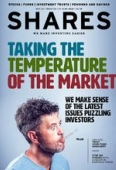Archived article
Please note that tax, investment, pension and ISA rules can change and the information and any views contained in this article may now be inaccurate.
Can you trust your fund manager?

The Woodford fund debacle has triggered a thousand articles about how a single investment product has not lived up to its hype, and how currently investors across the country are barred from cashing out of the fund if they so wish.
The significant amount of media attention is likely to lead some individuals to question their actively-managed fund holdings, and rightly so. If you are paying a fund manager to do the hard work, are they generating value for you?
The aftermath of the Woodford incident could see investors follow two different paths. First, they may probe fund managers’ performance and anyone not delivering the goods could see investors switch to alternative products. Second, more investors could embrace passive exchange-traded funds (ETFs) which simply track an index and don’t require the services of a fund manager to make all the decisions.
While many fund managers often enjoy a few good years’ performance, this may simply be down to luck and not skill. Very few fund managers have the skill with which to consistently deliver market-beating returns over a long period.
Even though the rise of the ETF has been much slower in the UK compared to the US, there is still growing demand. In recognition of this trend, Shares has recently increased the volume and frequency of its ETF coverage, providing readers with plenty of investment ideas and we will continue to look more closely at the passive space.
The investment trust space may also benefit from the Woodford situation as investors start to appreciate the fund structure’s advantage when it comes to holding more illiquid assets – namely that the fund manager doesn’t suffer from redemptions when investors want to get out and so the manager isn’t forced to undertake a fire-sale of assets in such a situation.
Our view is that active fund management is still valid and that the actions of Woodford should not put you off the space. We also believe there is room for investors to blend both an active and passive strategy in their portfolio.
The priority for investors should now be reassessing all actively-managed fund holdings. Are the managers doing what they originally said they would do when you bought each fund? If not, think about why they have deviated from the process and consider moving to a different fund – be it passive or actively-managed.
It is on this point that investment trusts benefit from having a board of directors. They have the power to fire a fund manager who isn’t doing what they said they would do, or has taken too many (or not enough) risks. Investors should take comfort that there is someone overseeing the fund manager and not letting them do anything they want.
The Woodford situation is likely to put more pressure on investment trust boards to review actions and performance, and ultimately keep fund managers on their toes. And it is likely to put pressure on managers across all types of funds to stick to a defined process, which has to be for the benefit of investors.
Important information:
These articles are provided by Shares magazine which is published by AJ Bell Media, a part of AJ Bell. Shares is not written by AJ Bell.
Shares is provided for your general information and use and is not a personal recommendation to invest. It is not intended to be relied upon by you in making or not making any investment decisions. The investments referred to in these articles will not be suitable for all investors. If in doubt please seek appropriate independent financial advice.
Investors acting on the information in these articles do so at their own risk and AJ Bell Media and its staff do not accept liability for losses suffered by investors as a result of their investment decisions.

 magazine
magazine








